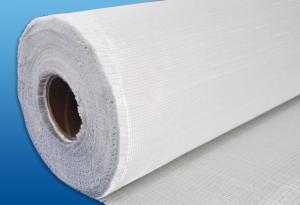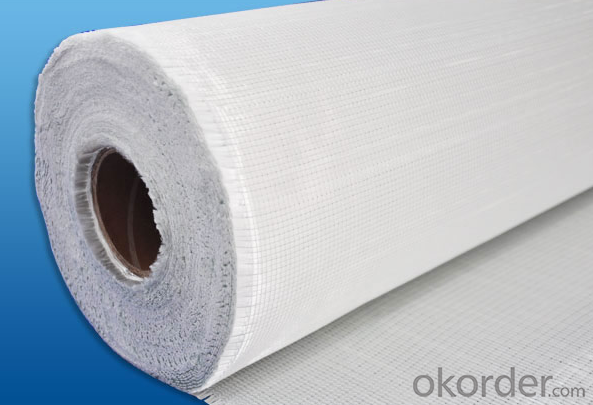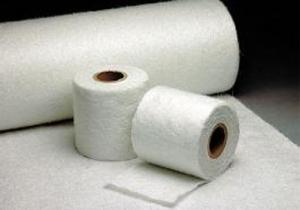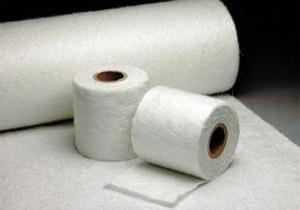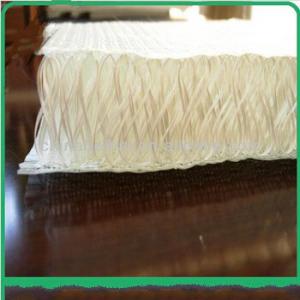Fiberglass Mat Tissue Sandwich Fabric Complex Mat
- Loading Port:
- China Main Port
- Payment Terms:
- TT or LC
- Min Order Qty:
- -
- Supply Capability:
- -
OKorder Service Pledge
OKorder Financial Service
You Might Also Like
Structure of FIBERGLASS SANDWICH FABRIC COMPLEX MAT Description:
This mat is the multi layered combination mat, generally made by mechanically stitching layers of roving or woven roving or chopped strand, in this case to one or both sides of synthetic fiber core (PP or PET), like a sandwich. The complex mat generally also be made from a combination of woven roving which are mechanically stitched with mats made of chopped strand to form the “bread”. Some complex mat even have no roving or fabric (i.e. complexes stitched from mats and veils without fabric layers). In all cases, the layers are mechanically stitched to the synthetic fiber core. It is mainly applied in the hand lay up, RTM and other close molding processes.
Main Features of the FIBERGLASS SANDWICH FABRIC COMPLEX MAT
◎ This fabric is compatible with UP Resin, Vinyl ester resin, epoxy resin system etc. It is widely used in closed mould applications for vehicle bodies and panels, marine (boat hulls and decks), windmill nacelles, leisure vehicle and structural shapes.
◎ The structure of sandwich to increase strength, reduce product weight and better surface finish.
◎ low resin-consumption and faster wet-out.
◎ Good manufacturability and mechanical properties
◎ Improved fatigue and impact resistance
◎ Good drapability for complicated shapes and good resin flow
FIBERGLASS SANDWICH FABRIC COMPLEX MAT Images
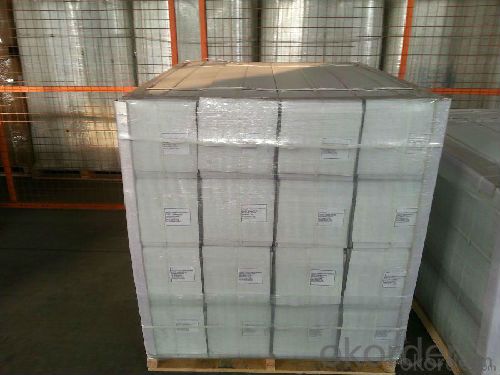
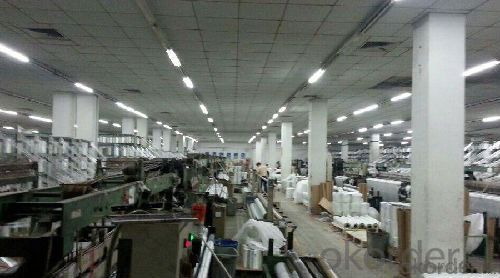
FIBERGLASS SANDWICH FABRIC COMPLEX MAT Specification
Code | Total weight g/m2 | Weight of each layer, g/m2 | Width, mm | ||
Chopping or roving or woven roving | Core Materials | Chopping | |||
E-MN300/P180 | 480 | 300 | 180 | 200~2600 | |
E-MNM300/P180/300 | 780 | 300 | 180 | 300 | 200~2600 |
E-MNM450/P250/450 | 1150 | 450 | 250 | 450 | 200~2600 |
E-MNM600/P180/600 | 1380 | 600 | 180 | 600 | 200~2600 |
E-LTNM300/P180/300 | 780 | 300 | 180 | 300 | 200~2600 |
E-LTNM450/P180/450 | 1080 | 450 | 250 | 450 | 200~2600 |
E-LTNM600/P180/300 | 1080 | 600 | 180 | 300 | 200~2600 |
E-WRNM400/P180/300 | 880 | 400 | 180 | 300 | 200~2600 |
E-WRNM600/P250/450 | 1300 | 600 | 250 | 450 | 200~2600 |
Packing:
Each roll is wrapped by PE film and then packed into carton. Stacking in bulk or palletized is available; the pallet shall be no higher than 2 layers.
FAQ of FIBERGLASS SANDWICH FABRIC COMPLEX MAT
Delivery Detail: 15-21days
Other spec. can be custom made as per customer's request.
- Q: What is the expected lifespan of fiberglass mat tissue in power generation applications?
- The lifespan of fiberglass mat tissue in power generation applications can vary depending on a range of factors, including the specific application, environmental conditions, and maintenance practices. However, fiberglass mat tissue is renowned for its durability and longevity, making it a popular choice in power generation. Typically, fiberglass mat tissue can endure for approximately 20 to 30 years in power generation applications. This longevity is attributed to its exceptional resistance to corrosion, heat, and chemicals, which are commonly encountered in power generation facilities. Additionally, fiberglass mat tissue can withstand high mechanical stress and maintain its structural integrity over extended periods. Nevertheless, it is important to acknowledge that the lifespan of fiberglass mat tissue can be influenced by factors such as exposure to extreme temperatures, humidity, and chemicals, as well as the frequency and quality of maintenance and inspections. Ensuring regular inspections and proper maintenance is crucial for significantly extending the lifespan of fiberglass mat tissue in power generation applications. To determine the specific expected lifespan of fiberglass mat tissue for a particular power generation application and operating conditions, it is advisable to consult with manufacturers and industry experts.
- Q: How does the weight of fiberglass mat tissue affect its performance?
- The weight of fiberglass mat tissue significantly affects its performance. The weight of the tissue refers to the amount of glass fibers per unit area. Generally, a higher weight indicates a higher concentration of fibers, which leads to improved strength and durability. Firstly, a heavier fiberglass mat tissue provides better tensile strength. The increased number of fibers in the tissue allows it to withstand higher levels of stress and strain without breaking or tearing. This makes it ideal for applications that require high load-bearing capacity, such as structural components in construction or automotive industries. Moreover, the weight of the tissue also influences its stiffness and rigidity. A heavier mat tissue offers better dimensional stability, meaning it will retain its shape and form even when subjected to external forces. This is crucial in applications where the material needs to maintain its structural integrity, such as in boat hulls or wind turbine blades. Furthermore, the weight of the fiberglass mat tissue affects its thermal and acoustic insulation properties. A higher weight typically correlates with better insulation capabilities, as the increased fiber density enhances the material's ability to trap air and reduce heat transfer or sound transmission. This makes it suitable for applications that require effective insulation, such as in buildings or industrial equipment. Lastly, the weight of the fiberglass mat tissue can impact its ease of handling and installation. A lighter tissue may be more flexible and easier to manipulate, making it simpler to fit into complex shapes or tight spaces. On the other hand, a heavier tissue might require additional support or equipment during installation. In conclusion, the weight of fiberglass mat tissue directly influences its performance characteristics, including tensile strength, rigidity, insulation properties, and ease of handling. Therefore, it is essential to consider the intended application and the desired performance requirements when selecting the appropriate weight of fiberglass mat tissue.
- Q: What are the different reinforcement orientations available for fiberglass mat tissue?
- There are several different reinforcement orientations available for fiberglass mat tissue, each serving a specific purpose in various applications. One common orientation is the unidirectional reinforcement, where the fibers are aligned in one direction. This orientation provides high strength and stiffness in the direction of alignment, making it suitable for applications that require resistance to tension or bending forces in a single direction. Another orientation is the bidirectional reinforcement, where the fibers are aligned in two perpendicular directions. This orientation provides equal strength and stiffness in both directions, making it ideal for applications that require resistance to both tension and compression forces. Bidirectional reinforcement is commonly used in structural components such as panels, pipes, and tanks. A third orientation is the randomly oriented reinforcement, where the fibers are distributed in a random manner. This orientation offers isotropic properties, meaning it provides similar strength and stiffness in all directions. Random reinforcement is often used in applications that require uniform strength and flexibility, such as automotive parts, boat hulls, and sporting goods. Additionally, there are also hybrid reinforcement orientations available, which combine different types of fibers or orientations to achieve specific performance requirements. These hybrid reinforcements can offer a combination of strength, stiffness, flexibility, and other desired properties, making them suitable for a wide range of applications. Overall, the choice of reinforcement orientation for fiberglass mat tissue depends on the specific requirements of the application, including the desired mechanical properties, the direction of forces to be resisted, and other performance considerations.
- Q: Is fiberglass mat tissue resistant to vibrations?
- Indeed, vibrations do not pose a threat to fiberglass mat tissue. Renowned for its remarkable tensile strength and enduring nature, fiberglass possesses the capability to endure mechanical strains and vibrations. The tightly interwoven fibers within the mat tissue ensure exceptional robustness and steadiness. Thus, fiberglass mat tissue emerges as the perfect substance for domains where vibrations demand attention, including construction, aerospace, and automotive sectors. Moreover, the material's insulation qualities contribute to its enhanced resilience against vibrations.
- Q: Can fiberglass mat tissue be used for insulating radiant floors?
- Yes, fiberglass mat tissue can be used for insulating radiant floors. Fiberglass is a popular insulation material due to its excellent thermal properties and resistance to moisture. Fiberglass mat tissue, in particular, is designed to provide additional strength and durability to the insulation layer. When used in radiant floor systems, it helps to prevent heat loss and improve energy efficiency by creating a barrier between the heated floor and the cooler ground or subfloor. Additionally, fiberglass mat tissue is easy to install and can be cut to fit any shape or size, making it a versatile choice for insulating radiant floors.
- Q: What is the expected lifespan of fiberglass mat tissue in underground applications?
- The expected lifespan of fiberglass mat tissue in underground applications can vary depending on various factors such as the specific conditions, environmental factors, and maintenance practices. However, on average, fiberglass mat tissue used in underground applications can have a lifespan ranging from 25 to 50 years.
- Q: Can fiberglass mat tissue be used for automotive repairs?
- Yes, fiberglass mat tissue can be used for automotive repairs. Fiberglass mat tissue is a versatile material that is commonly used in various industries, including the automotive industry. It is often used for reinforcing and repairing auto body panels, as well as fixing cracks, holes, and other damages in the vehicle's body. Fiberglass mat tissue is made up of fine fibers that are bound together with a resin. This composition gives it excellent strength and flexibility, making it ideal for automotive repairs. It can be easily shaped and molded to fit different contours and shapes of car parts, ensuring a seamless repair. Additionally, fiberglass mat tissue is lightweight and durable, which is crucial for automotive repairs. It provides excellent resistance against corrosion, weathering, and other external elements, ensuring the longevity of the repair. It also offers good impact resistance, protecting the repaired area from further damage. Furthermore, fiberglass mat tissue is compatible with various types of automotive coatings, such as primers, paints, and clear coats. This allows for a smooth and professional finish after the repair is complete. In conclusion, fiberglass mat tissue is a suitable material for automotive repairs due to its strength, flexibility, durability, and compatibility with automotive coatings. It is commonly used in the industry for reinforcing and repairing auto body panels, fixing damages, and ensuring a seamless finish.
- Q: Does fiberglass mat tissue require any special tools for installation?
- Special tools may be needed for installing fiberglass mat tissue. These tools may include a utility knife or scissors for cutting the mat to the desired size, a roller or brush for applying adhesive or resin to secure the mat to the desired surface, and safety equipment like gloves and goggles to protect the installer from potential dangers. Furthermore, certain installations may necessitate the use of a heat gun or torch to activate or cure the resin. To ensure proper installation and ascertain if any special tools are necessary, it is crucial to carefully read and adhere to the manufacturer's instructions and recommendations for the specific fiberglass mat tissue being used.
- Q: How does the surface finish of fiberglass mat tissue affect its adhesion to resin?
- The surface finish of fiberglass mat tissue can significantly affect its adhesion to resin. The surface finish refers to the texture or smoothness of the fiberglass mat tissue. In general, a rougher surface finish tends to provide better adhesion to resin. This is because a rough surface provides more surface area for the resin to adhere to, allowing for a stronger bond. Rougher surface finishes can be achieved through various manufacturing techniques, such as using coarser fibers or adding texturizing agents during production. On the other hand, a smoother surface finish may result in weaker adhesion. A smooth surface does not provide as much surface area for the resin to bond with, leading to a weaker and less durable bond. Smoother surface finishes can be achieved by using finer fibers or through additional processing steps to smooth out the surface. It is important to consider the specific application and requirements when choosing the surface finish of fiberglass mat tissue. For applications that require high strength and durability, a rougher surface finish may be preferred to ensure optimal adhesion to the resin. Conversely, for applications where a weaker bond is acceptable or where a smoother surface finish is desired for aesthetic reasons, a smoother surface finish may be chosen. Ultimately, the surface finish of fiberglass mat tissue plays a critical role in determining the adhesion to resin. It is essential to select the appropriate surface finish to achieve the desired strength, durability, and performance in various applications.
- Q: How does fiberglass mat tissue perform in terms of dimensional stability?
- The dimensional stability of fiberglass mat tissue is exceptional. This is due to its unique composition and manufacturing process, which result in minimal shrinkage or expansion when exposed to temperature variations or moisture. As a result, fiberglass mat tissue is an ideal material for various applications in the construction industry, where dimensional stability is crucial. It is commonly used to reinforce walls, roofs, and floors. The consistent size and shape of fiberglass mat tissue ensure that it maintains its original dimensions over time, providing long-lasting durability and reliability. Furthermore, its dimensional stability allows for precise cutting, shaping, and installation, reducing waste and increasing efficiency in manufacturing processes. Overall, the excellent dimensional stability of fiberglass mat tissue makes it a preferred choice in industries where accurate and stable dimensions are essential.
Send your message to us
Fiberglass Mat Tissue Sandwich Fabric Complex Mat
- Loading Port:
- China Main Port
- Payment Terms:
- TT or LC
- Min Order Qty:
- -
- Supply Capability:
- -
OKorder Service Pledge
OKorder Financial Service
Similar products
Hot products
Hot Searches
Related keywords
